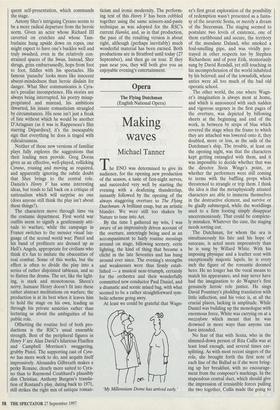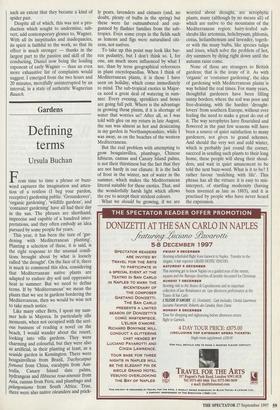Opera
The Flying Dutchman (English National Opera)
Making waves
Michael Tanner
The ENO was determined to give its audience, for the opening new production of the season, a taste of first-night nerves, and succeeded very well by starting the evening with a deafening thunderclap, instantly followed by the opening of the always staggering overture to The Flying Dutchman. A brilliant coup, but an artistic blunder. We were still too shaken by Nature to tune into Art.
By the time I gathered my wits, I was aware of an impressively driven account of the overture, annoyingly being used as an accompaniment to fairly routine messings around on stage, billowing scenery, eerie lighting, the kind of thing that became a cliché in the late Seventies and has hung around ever since. The evening's strengths and weaknesses were thus firmly estab- lished — a musical near-triumph, certainly for the orchestra and their wonderfully committed new conductor Paul Daniel, and a dramatic and scenic mixed bag, with what seemed to be a rather straightforward sym- bolic scheme going awry.
At least we could be grateful that Wagn- My Millennium Dome has arrived early.' er's first great exploration of the possibility of redemption wasn't presented as a fanta- sy of the neurotic Senta, or merely a dream of the Steersman. The staging seemed to postulate two levels of existence, one of them earthbound and secure, the territory of the mundane Daland, who smoked a foul-smelling pipe, and was vividly por- trayed in other respects too by Stephen Richardson; and of poor Erik, stentorianly sung by David Rendall, yet still touching in his incomprehension of the world inhabited by his beloved; and of the townsfolk, whose antics were all too much of the bad old operatic school.
The other world, the one where Wagn- er's imagination is always most at home, and which is announced with such sudden and vigorous urgency in the first pages of the overture, was depicted by billowing sheets at the beginning and end of the work, in between by strips of blue which covered the stage when the frame to which they are attached was lowered onto it; they doubled, more or less, as the sails of the Dutchman's ship. The trouble, at least on the opening night, was that the characters kept getting entangled with them, and it was impossible to decide whether that was the director Stein Winge's point, or whether the performers were still coming to terms with the baffling props which threatened to strangle or trip them. I think the idea is that the metaphysically attuned characters are able to immerse themselves in the destructive element, and survive or be gladly submerged, while the worldlings used to a firm footing simply disappear unceremoniously. That could be complete- ly mistaken. Whatever the case, the staging needs sorting out.
The Dutchman, for whom the sea is simultaneously his fate and his hope of surcease, is acted more impressively than he is sung by Willard White. With his imposing physique and a leather coat with exceptionally majestic lapels, he is every inch the figure of the romantic doomed hero. He no longer has the vocal means to match his appearance, and may never have had the imagination to do Wagner's first genuinely heroic role justice. He sings David Pountney's plodding translation with little inflection, and his voice is, at all the crucial places, lacking in amplitude. While Daniel was building up the monologue with enormous force, White was carrying on at a mezzoforte which meant that he was drowned in more ways than anyone can have intended.
No fear of that with Senta, who in the slimmed-down person of Rita Cullis was at least loud enough, and several times ear- splitting. As with most recent singers of the role, she brought forth the first note of each line of the Ballad as if she were bring- ing up her breakfast, with no encourage- ment from the composer's markings. In the stupendous central duet, which should give the impression of irresistible forces pulling the two together, Cullis made the going to such an extent that they became a kind of spider pair.
Despite all of which, this was not a pro- duction which sought to undermine, sub- vert, add contemporary glosses to, Wagner. With all its ineptitudes and inadequacies, its spirit is faithful to the work, so that its effect is much stronger — thanks in the largest part to the passion and skill of the conducting, Daniel now being the leading exponent of early Wagner — than an even more exhaustive list of complaints would suggest. I emerged from the two hours and 20 minutes, mercifully uninterrupted by an interval, in a state of authentic Wagnerian Rausch.











































































 Previous page
Previous page